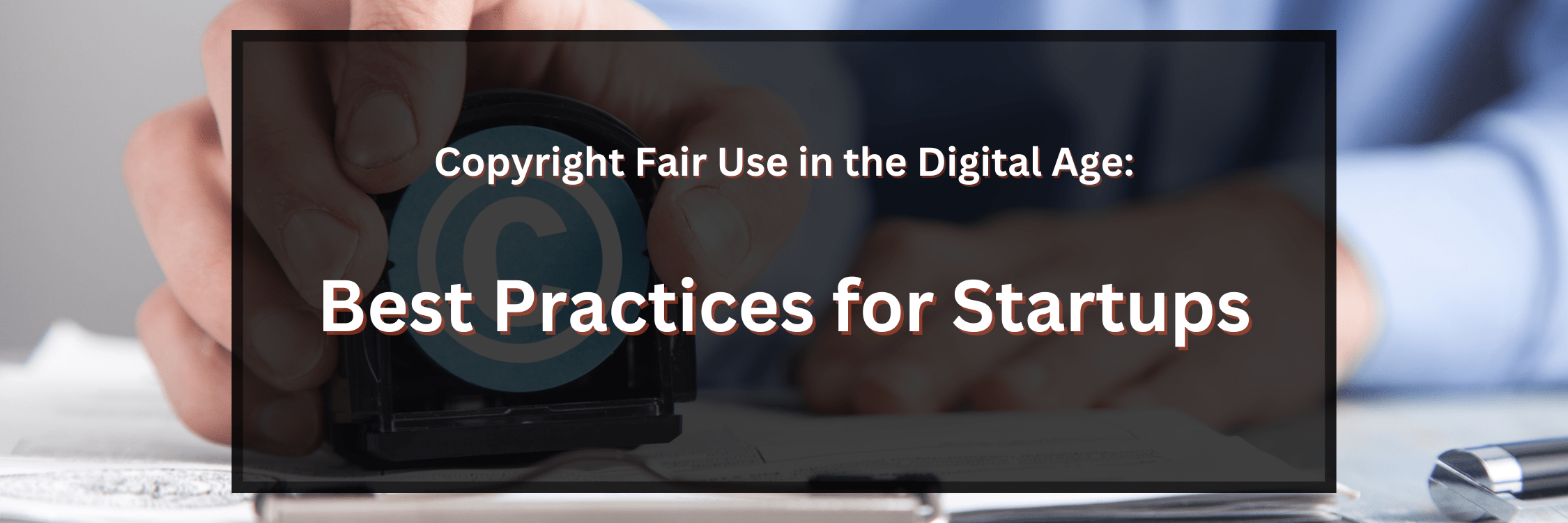In the digital age, where the exchange of ideas and content is as swift as a click, startups find themselves at the intersection of creativity and legal intricacies. Copyright fair use, a legal doctrine allowing the use of copyrighted material under certain conditions, becomes a navigational compass for startups in the digital landscape. This guide seeks to illuminate the path, offering best practices for startups to responsibly use others’ content while respecting intellectual property rights, fostering creativity, and steering clear of legal entanglements.
Understanding Copyright Fair Use
Copyright fair use is a doctrine within copyright law that permits the limited use of copyrighted material without obtaining permission from or paying royalties to the copyright owner. The key lies in the purpose of use, the nature of the copyrighted work, the amount used, and the impact on the market value of the original work. While fair use provides flexibility, its application in the digital age demands a nuanced approach.
Best Practices for Startups
- Educate Your Team:
Start by ensuring that your team is well-versed in the principles of copyright fair use. Educate them on the factors that contribute to fair use, emphasizing the importance of responsible and ethical use of others’ content. - Conduct a Fair Use Analysis:
Before incorporating copyrighted material into your startup’s content, conduct a fair use analysis. Consider the purpose of use, the nature of the copyrighted work, the amount used, and the potential impact on the market for the original work. This preliminary assessment can guide your decision-making process. - Attribution and Transparency:
When utilizing copyrighted material, practice transparency and provide clear attribution to the original creator. This not only aligns with ethical standards but also establishes good faith in your startup’s use of the content.
Navigating Fair Use in Different Scenarios
- Social Media Content:
In the realm of social media, startups often engage with and share content created by others. When doing so, ensure that your use aligns with fair use principles. Additionally, review the terms of service of the social media platform to understand any specific guidelines related to content sharing. - User-Generated Content:
If your startup involves user-generated content, implement robust guidelines that educate users on responsible content creation. Encourage originality while emphasizing the importance of respecting copyright and fair use principles.
Respecting Intellectual Property Rights
- Obtain Permission when Necessary:
When in doubt about the applicability of fair use, seek permission from the copyright owner. This proactive approach not only mitigates legal risks but also establishes a positive relationship with content creators. - Monitor Your Content:
Regularly monitor your startup’s content to ensure that it aligns with fair use principles. This includes not only content created by your team but also user-generated content and any material shared on your platform.
Promoting Creativity and Innovation
- Encourage Original Content:
Foster a culture of creativity within your startup by encouraging the creation of original content. This not only reduces reliance on others’ copyrighted materials but also positions your startup as a source of innovative ideas. - Leverage Public Domain Resources:
Explore and leverage resources available in the public domain. Public domain materials are not subject to copyright restrictions, providing startups with a wealth of creative possibilities without legal constraints.
Avoiding Legal Conflicts
- Stay Informed about Copyright Laws:
Keep your team informed about changes in copyright laws and legal precedents. This proactive approach ensures that your startup remains compliant with evolving regulations. - Consult Legal Professionals:
In complex situations or when uncertain about fair use, consult legal professionals specializing in intellectual property law. Their expertise can provide tailored guidance that aligns with the specific needs of your startup.
Conclusion: Charting a Responsible Course in the Digital Age
As startups navigate the digital currents where ideas flow freely, the principles of copyright fair use become a compass for responsible content creation. It’s not just about compliance with legal standards; it’s a commitment to ethical practices that respect the creative efforts of others while fostering innovation within your startup.
In the dynamic interplay between creativity and legal responsibility, startups have the opportunity to carve a path that transcends legal constraints and cultivates a culture of respect for intellectual property. By adopting best practices, staying informed, and fostering a creative environment, startups can thrive in the digital age while charting a course that is both innovative and ethically sound. In doing so, startups become not just consumers of content but contributors to a digital ecosystem where creativity flourishes, legal boundaries are respected, and the entrepreneurial spirit remains untethered by legal conflicts.
Title: Copyright Fair Use in the Digital Age: Best Practices for Startups
Introduction
In the digital age, where the exchange of ideas and content is as swift as a click, startups find themselves at the intersection of creativity and legal intricacies. Copyright fair use, a legal doctrine allowing the use of copyrighted material under certain conditions, becomes a navigational compass for startups in the digital landscape. This guide seeks to illuminate the path, offering best practices for startups to responsibly use others’ content while respecting intellectual property rights, fostering creativity, and steering clear of legal entanglements.
Understanding Copyright Fair Use
Copyright fair use is a doctrine within copyright law that permits the limited use of copyrighted material without obtaining permission from or paying royalties to the copyright owner. The key lies in the purpose of use, the nature of the copyrighted work, the amount used, and the impact on the market value of the original work. While fair use provides flexibility, its application in the digital age demands a nuanced approach.
Best Practices for Startups
- Educate Your Team:
Start by ensuring that your team is well-versed in the principles of copyright fair use. Educate them on the factors that contribute to fair use, emphasizing the importance of responsible and ethical use of others’ content. - Conduct a Fair Use Analysis:
Before incorporating copyrighted material into your startup’s content, conduct a fair use analysis. Consider the purpose of use, the nature of the copyrighted work, the amount used, and the potential impact on the market for the original work. This preliminary assessment can guide your decision-making process. - Attribution and Transparency:
When utilizing copyrighted material, practice transparency and provide clear attribution to the original creator. This not only aligns with ethical standards but also establishes good faith in your startup’s use of the content.
Navigating Fair Use in Different Scenarios
- Social Media Content:
In the realm of social media, startups often engage with and share content created by others. When doing so, ensure that your use aligns with fair use principles. Additionally, review the terms of service of the social media platform to understand any specific guidelines related to content sharing. - User-Generated Content:
If your startup involves user-generated content, implement robust guidelines that educate users on responsible content creation. Encourage originality while emphasizing the importance of respecting copyright and fair use principles.
Respecting Intellectual Property Rights
- Obtain Permission when Necessary:
When in doubt about the applicability of fair use, seek permission from the copyright owner. This proactive approach not only mitigates legal risks but also establishes a positive relationship with content creators. - Monitor Your Content:
Regularly monitor your startup’s content to ensure that it aligns with fair use principles. This includes not only content created by your team but also user-generated content and any material shared on your platform.
Promoting Creativity and Innovation
- Encourage Original Content:
Foster a culture of creativity within your startup by encouraging the creation of original content. This not only reduces reliance on others’ copyrighted materials but also positions your startup as a source of innovative ideas. - Leverage Public Domain Resources:
Explore and leverage resources available in the public domain. Public domain materials are not subject to copyright restrictions, providing startups with a wealth of creative possibilities without legal constraints.
Avoiding Legal Conflicts
- Stay Informed about Copyright Laws:
Keep your team informed about changes in copyright laws and legal precedents. This proactive approach ensures that your startup remains compliant with evolving regulations. - Consult Legal Professionals:
In complex situations or when uncertain about fair use, consult legal professionals specializing in intellectual property law. Their expertise can provide tailored guidance that aligns with the specific needs of your startup.
Conclusion: Charting a Responsible Course in the Digital Age
As startups navigate the digital currents where ideas flow freely, the principles of copyright fair use become a compass for responsible content creation. It’s not just about compliance with legal standards; it’s a commitment to ethical practices that respect the creative efforts of others while fostering innovation within your startup.
In the dynamic interplay between creativity and legal responsibility, startups have the opportunity to carve a path that transcends legal constraints and cultivates a culture of respect for intellectual property. By adopting best practices, staying informed, and fostering a creative environment, startups can thrive in the digital age while charting a course that is both innovative and ethically sound. In doing so, startups become not just consumers of content but contributors to a digital ecosystem where creativity flourishes, legal boundaries are respected, and the entrepreneurial spirit remains untethered by legal conflicts.





